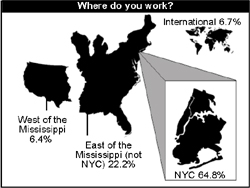
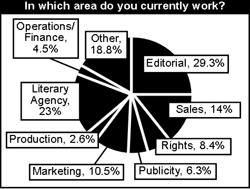
Not sure which refreshments to serve at your next publishing soirée? Wine and beer are the safest bets…but it wouldn’t hurt to stash a few joints behind the bar either. Providing a protective cloak of anonymity in its first annual survey, PT uncovered the quirkier side and secret aspirations of publishing people, not to mention how they really feel about their singular industry (“no innovation!”). With a response rate well in the double digits, the survey also inspired hundreds of respondents to write in their own comments, offering insight that goes beyond the typical salary comparisons and demographic data gleaned from other industry surveys.
From virtually all areas of the industry and country, publishing people from CEOs to assistants added their two cents, but the typical respondent was around 45 and works at a publisher. Editors responded disproportionately which may explain why they also claim that “filling out surveys” is a favorite office time-waster. New York is home to two thirds of the respondents and 28.3% have more than a quarter century experience in the industry.
Let’s Be Social
Despite the industry’s somewhat luddite reputation, 36% of respondents engage in social networking. Proletarian MySpace (20.4%) and professional LinkedIn (18.5%) attract the most with wunderkind Facebook (14.3%) following close behind. As a way to connect with friends, MySpace is a hit, but as an aside, some book people are blunt about its dismal publishing potential. “MySpace isn’t really that helpful in promoting authors,” comments a prominent New York agent. “But it’s one thing an author can use to feel proactive, so it’s worth trying. There aren’t a lot of outlets for authors to feel like they’re working to promote themselves actively.”
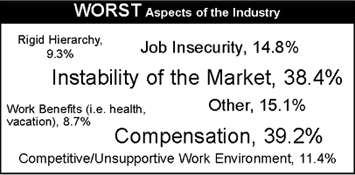
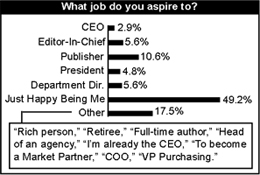
When not updating their online personae, lots (40%) read blogs (Huffington Post and celebrity gossip being favorites) and 31.7% say they get their publishing news from industry sites blogs. After independent booksellers (49.4%), most publishing people buy books online (48.9%). Yet 14.8% of respondents report that they’re “still getting into Web 1.0.” A marketer-cum-editor confesses that she feels “very low-tech compared to a lot of other people I know. I’m most curious about the new Sony Reader and other similar devices.”
So if online networking isn’t your thing, but you’d still like to be social, consider working at an agency. Literary agents talk amongst themselves the most with 47.7% reporting their biggest office time waster is chatting in real life. They might be friendly at the office, but the largest group of them (43.1%) says that less than 5% of their friends are in publishing and 22.2% say fewer than a quarter of their friends work in the business. The friendliest department is editorial as 77.6% say that at least one in four of their inner circle works in publishing and 40% say at least half of their closest friends are in publishing.
Everyone has a book in them, but editors are actually writing it. Almost half (48.6%) of those in editorial call themselves writers, both published and unpublished, compared with the 29.6% overall response. Marketing has the next biggest group of writers, aspiring and arrived, (36.4%) and rights people are the least authorial, with 70.4% saying they never feel the creative urge.
Our Own Brand of Insanity
Predictably, the siren song of publishing attracted more than 2/3 of respondents (68.3%) to the industry when they were between the ages of 21-27. Those who arrive later come from a variety of unlikely places, such as the 30-something New York agent who started out in children’s theatre. “The amount of drama in the office [was] insane,” he says. “Someone would cry everyday; people were always doing imitations or breaking out into song. So while publishing has its own brand of insanity, it fits better with who I am.” Among respondents are former teachers (Latin, ESL, Spanish), lawyers (patent attorney, immigration), actors (film, TV, and theatre), hospitality workers, and non-profiteers, not to mention the oil executive, dancers, U.S. Navy officer, baker, waitress, and government defense contractor.
Indeed, whether they begin their career in publishing or not, the industry seems to be a relatively happy place for most with the exception of an agent who says “every sale I make is like getting a root canal.” Just about a third (32%) “never” consider leaving and another 18.5% feel like throwing in the towel only when the season changes. The department with the fewest flight fantasies is marketing. Almost half (45.5%) “never” consider leaving the publishing industry and 44.1% report their departmental choice is “a perfect fit!”
Perhaps inspired by travels to distant book fairs, people in rights daydream the most about leaving; 59.2% consider striking off “seasonally” or “yearly.” Salespeople report the most overall satisfaction. When asked if happy working in their department, 74% say “yes” or “it’s a perfect fit!” compared with 65% overall.
If the book industry were to collapse tonight, other media would probably be inundated with resumes tomorrow. Not taking potential salary into consideration, if they had to leave publishing, the biggest group of book people would dabble in broadcast (21.8%) or print media (16.8%), followed by non-profit work (14.5%) and education (13.2%). When salary comes into play, however, publishing folk become a bit less altruistic. While media still rules as the top choice, finance (10.5%) edges out non-profits (9.1%) and education (9.4%). Plenty have horticultural fantasies also or of doing “anything outdoors,” perhaps running a “canine country club” or “driving a UPS truck.” One cheeky respondent dreams of taxidermy. Several consider sports as well: driving race cars, working in “the bicycle industry,” “golfing,” or managing pro teams.
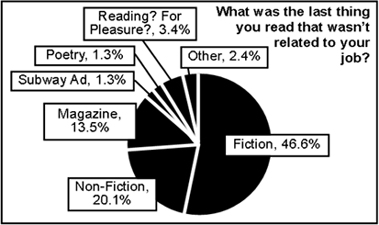
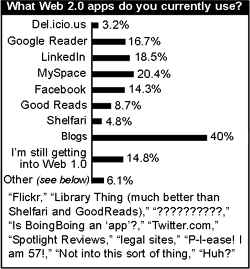 Gripes
Gripes
Commiserating over dismal entry level pay is universal across industry and geography, which could explain why 73.6% of the youngest respondents aged 21 to 35 report knowing they make “less” or “much less” than peers outside publishing. Compared with respondents 36 and older, they’re about five times as likely to know what their peers make. Whether they talk about it or not, most in publishing cite compensation as the worst aspect of the industry (39.2%).
But don’t count on supplementing a meager income by skimming off your company’s expense account until you’ve been around a while. Only half (51.2%) of the youngest respondents (21-27) has access to a company credit card and most of them (76.9%) spend under $50 per week. Not until respondents hit the 36-45 range does pretty much everyone (81.1%) have an expense account and the largest group of them charges over $100 a week (48.4%). The biggest spenders are salespeople of whom 54.6% write off over $100 a week. For editors still waiting for an agent to pick up the lunch tab, this will not come as a surprise: literary agents spend the least with 40.7% reporting weekly charges under $50.
Money isn’t the only thing publishing people gripe about. When asked about the best and worst aspects of the industry, twice as many wrote in with complaints as praise and they didn’t mince words either, not even for their colleagues. According to some, publishers lack vision, editors lack taste, managers don’t understand the business, authors have bad behavior, and a pot-smoking West Coast sales rep gets frustrated by the “idiots” he has to deal with at the companies he represents. An Oregonian publisher thinks the industry is “too narrowly focused in NYC” and one VP of Sales and Marketing at a major publisher simply “fears for the future of the biz.” Overall, after compensation, the unstable market (38.4%), job insecurity (14.8%), and a competitive/unsupportive work environment (11.4%) worry the most.
Gratifications
Though the unpredictable market irks book people to no end, it’s also what seems to bring the most gratifying moments. For the president of an international rights agency in the Northeast, all the effort becomes worth it when “that ‘little book’ gets astonishing royalties because you never really know when a book will sell or not.” Indeed, perhaps cracking the capricious market is part of the “intellectual challenge” that 63% of respondents cite as the best part of their jobs. And despite occasionally grumbling about them, 48.1% say “working with like-minded people” is the best part. “Contributing to literary culture” (39.7%) and a “flexible schedule” (24.1%) also enthuse the industry. A little fame doesn’t hurt either. “Meeting someone who has read and enjoyed a book on which I’ve worked” is a high point for one editor. Some simply like all the free books and going to Frankfurt (though schlepping across the sea is a downside for others).
No matter what side you’re on in publishing, seeing one of your books “make it” in spite of naysayers is undeniably delightful though not everyone goes to this extreme of showing that damn editor/ agent/publisher/marketer just how wrong they were: “The most gratifying moments are when a novel or memoir that I’ve been told over and over is ‘difficult’ sells tons of copies,” comments an agent. “Even more gratifying is when an editor writes to you about said book and says, ‘gosh… we really would have liked to have published that book here.’ I’m happy to send them a copy of the finished book with a copy of their very opinionated rejection letter folded neatly inside.”





